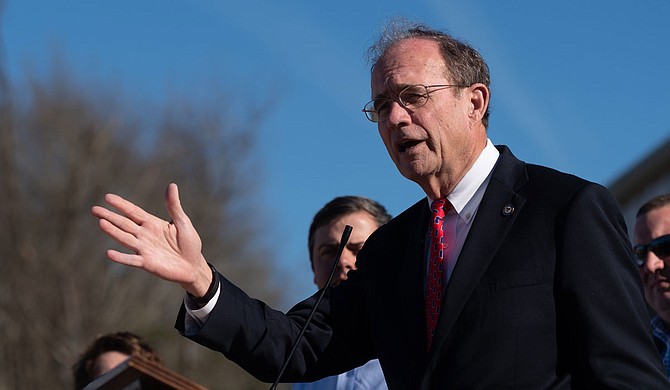Mississippi Lt. Gov. Delbert Hosemann said Monday that the state Senate will thoroughly examine a House bill that proposes several significant changes in state tax rates. Photo by Ashton Pittman
JACKSON, Miss. (AP) — Mississippi Lt. Gov. Delbert Hosemann said Monday that the state Senate will thoroughly examine a House bill that proposes several significant changes in state tax rates.
Hosemann, a Republican, said during an online press forum that he has asked certified public accountants and the state economist to analyze House Bill 1439, which is more than 300 pages long.
“I have concerns about raising anybody's taxes,” Hosemann said. “There are significant things to discuss here.”
The bill would phase out the personal income tax and cut the 7% grocery tax in half over several years. It would also increase several other taxes, including the state sales tax on most items, which would go from the current 7% to 9.5%. Tax rates would increase on items including cars and trucks, cigarettes, alcohol, farm equipment and manufacturing equipment.
Mississippi does not collect income tax from retired people, and Hosemann said he has heard from retirees who worry about paying a higher sales tax. He said farm groups are concerned about increasing the cost of tractors and other big equipment. Hosemann said he is concerned about altering tax credits for job creation and tax deductions for charitable donations.
Hosemann said he wants the Mississippi Manufacturers Association and the Mississippi Economic Council to weigh in on the proposed changes.
House leaders introduced their tax overhaul proposal on Feb. 22, and they pushed it through the Ways and Means Committee the same day. They pushed it through the House on an 85-34 vote the next day, with 72 votes needed to pass. It was mostly a partisan split, but a few Democrats voted for the bill and one Republican opposed it.
The bill did not include a fiscal note to outline the impact the proposed changes could have on the state budget.
Enacting changes to state tax laws takes a three-fifths majority of both the House and the Senate. Republicans hold enough seats in each chamber to make changes without needing any votes from Democrats.
Republican Gov. Tate Reeves mentioned his wish to phase out the income tax in November, when he released his budget proposals for the year that will begin July 1. He touched on it again during his State of the State address in January.
As the House was debating its bill last week, Reeves said he opposes increasing tax rates. Overriding a veto would require a larger margin of two-thirds of the House and Senate.
During Mississippi’s budget year that ended June 30, the state collected about $5.8 billion from all types of state taxes, fees and other sources, including lawsuit settlements, according to the state Department of Finance and Administration. The biggest chunk of money, about $2.2 billion, came from sales taxes. The next-largest source was about $1.8 billion from individual income taxes.



Comments
Use the comment form below to begin a discussion about this content.